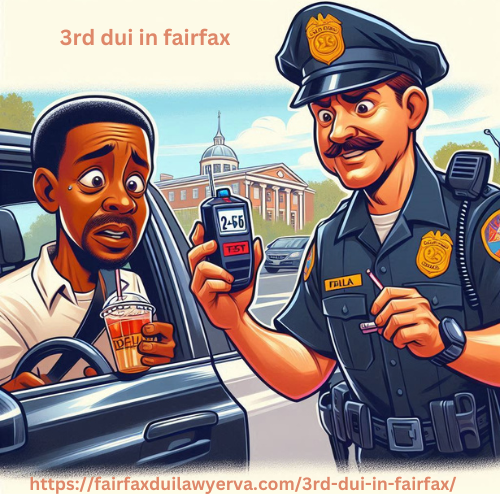Introduction
Facing a third DUI (Driving Under the Influence) charge in Fairfax is a serious legal matter with potentially life-altering consequences. Virginia imposes some of the nation’s harshest penalties for repeat DUI offenses, and a third conviction is classified as a Class 6 felony. With mandatory jail time, substantial fines, and the risk of losing driving privileges indefinitely, the stakes are higher than ever. However, being charged does not mean your case is hopeless. With the right legal defense strategies, it is possible to challenge the evidence, negotiate reduced penalties, or even avoid a conviction. In this article, we will explore the most effective legal defense strategies for a 3rd dui in fairfax and provide guidance on how to approach this difficult situation.
1. Understanding the Severity of a Third DUI in Fairfax
Before exploring defense strategies, it’s crucial to understand the gravity of a third DUI charge in Virginia. The consequences are severe and can include:
- Mandatory Jail Time: A third DUI within 10 years carries a mandatory minimum sentence of 90 days. If the offense occurs within five years, the mandatory minimum increases to six months.
- Substantial Fines: Fines range from $1,000 to $2,500, with a mandatory minimum of $1,000.
- Permanent Criminal Record: A third DUI conviction is classified as a felony, which remains on your record for life.
- Indefinite License Revocation: Your driver’s license may be revoked indefinitely, with eligibility for restricted driving privileges only after three years.
- Ignition Interlock Device (IID): If driving privileges are eventually restored, the installation of an IID is mandatory.
- Given these severe penalties, building a strong legal defense is essential to protect your future.
2. Challenging the Traffic Stop
One of the first steps in a DUI defense is examining whether the initial traffic stop was lawful. Police officers must have reasonable suspicion to pull you over, such as observing erratic driving, speeding, or other traffic violations. If your attorney can demonstrate that the officer lacked reasonable suspicion, any evidence gathered during the stop, including breathalyzer or blood test results, may be inadmissible in court.
3. Questioning the Accuracy of BAC Evidence
Blood alcohol concentration (BAC) results are a cornerstone of most DUI cases, but they are not infallible. There are several ways to challenge the accuracy of BAC evidence, including:
Breathalyzer Maintenance and Calibration: Breathalyzers must be properly calibrated and maintained to produce accurate results. Your attorney can request maintenance records to identify any discrepancies.
Improper Administration: Officers must follow strict protocols when conducting breath or blood tests. Any deviation from these procedures can compromise the validity of the results.
Medical Conditions: Certain medical conditions, such as acid reflux or diabetes, can produce falsely elevated BAC readings.
4. Evaluating Field Sobriety Tests
Field sobriety tests (FSTs) are often used by officers to establish probable cause for a DUI arrest. However, these tests are highly subjective and prone to error. Your attorney can challenge the reliability of FSTs by highlighting factors such as:
- Poor weather or road conditions that may have affected your performance.
- Physical disabilities or medical issues that made the tests more difficult.
- Inadequate instructions or improper administration by the officer.
5. Reviewing Police Conduct
Police officers are required to follow specific procedures when conducting a DUI investigation. Any misconduct or failure to follow protocol could weaken the prosecution’s case. Examples of improper police conduct include:
- Failing to inform you of your rights (Miranda warnings).
- Coercing you into taking a test without proper consent.
- Mishandling evidence or failing to document the chain of custody.
6. Negotiating a Plea Agreement
It can be feasible to work out a plea deal with the prosecutor in some situations. In exchange for lighter punishments, this can entail entering a guilty plea to a lower crime, such reckless driving. A plea deal can help you escape a felony conviction and lessen the long-term effects on your life, even while it won't completely remove the repercussions.
7. Highlighting Mitigating Factors
Courts may consider mitigating factors when determining sentencing. These factors can demonstrate your commitment to addressing the issue and making positive changes. Examples include:
- Voluntarily enrolling in an alcohol education or treatment program.
- Demonstrating a clean record of behavior since your last conviction.
- Providing character reference letters from employers, family members, or community leaders.
8. Seeking Alternative Sentencing Options
Depending on the circumstances of your case, the court may allow for alternative sentencing options. These can include extended probation, intensive outpatient treatment, or participation in programs designed for repeat DUI offenders. Your attorney can advocate for these options as part of your defense strategy.
Conclusion
A 3rd dui in fairfax is a serious offense with potentially life-changing consequences. However, it’s important to remember that being charged does not guarantee a conviction. By working with an experienced DUI attorney and employing effective legal defense strategies, you can fight to protect your rights and minimize the impact on your life. Whether it’s challenging the legality of the traffic stop, questioning the reliability of evidence, or negotiating a plea agreement, there are avenues to pursue a more favorable outcome. Taking proactive steps now can make all the difference in navigating this challenging time and moving forward with your life.





Comments